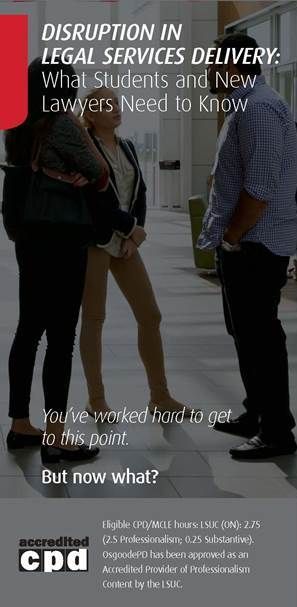
Legal professionals and industry-watchers have pointed out that there are substantial and disruptive changes occurring in the legal industry, largely driven by technology, including changes in service delivery, firm structure and career trajectories. While challenging traditional models, however, disruptive change can mean significant opportunity, especially for those students with the benefit of a legal education.
On March 2, some notable figures in the legal field will be presenting their insights to attendees at a Queen’s Law / Osgoode Hall co-presentation. Disruption in Legal Services is an informative evening of speakers, hosted at Osgoode and simultaneously streamed live to Queen’s, focusing on how the industry is changing and how to keep pace.
“We developed this program for current law students, recent graduates and new practitioners to help give them a better understanding of a legal market that we know is undergoing significant evolution,” says Dirk Rodenburg, Queen’s Law’s Director of Undergraduate and Professional Education. “We wanted to give students a cross-section of perspectives on the impact of these changes, and the incredible range of opportunity they generate for students willing to look past existing professional career trajectories.”
Speakers like Addison Cameron-Huff, Law’12, will be speaking in their professional capacity as lawyers in leading fields such as law and technology; other legal professionals will be furnishing their viewpoints and perspectives from within, and outside of, the legal industry.
The evening will also examine how service delivery is being changed at every level of the legal practice, from big law through to in-house counsel and the private sector, as well as new opportunities technology is bringing to the practice of law.
While the presentation will be hosted at Osgoode Professional Development in Toronto, the conference will be streaming to Queen’s Law’s premises through a video conference link in Room 211 at Macdonald Hall.
“We wanted to have this program happening in real time both in Toronto and Kingston,” Rodenburg explained. “Live streaming allows Queen’s students to virtually “attend” this conference while it was unfolding in Toronto, at our home faculty at Queen’s.”
In addition to the live event in Toronto, and the stream to Queen’s campus, there are also plans to re-distribute the material to those who register and want to stream the event at home; as the event is streamed, video capture may also be made available down the line for those who couldn’t catch the session live. “We’ve had interest from several people who aren’t available on the evening of March 2,” Rodenburg says, “so this option is of great interest to people who understand the value of the workshop, but aren’t available in the moment to watch.”
“It’s satisfying to see that a conference that is ultimately about the disruptive nature of technology on the legal industry can itself use technology to disrupt traditional limitations to delivery, and provide the experience of attending the symposium to as many people as possible.”